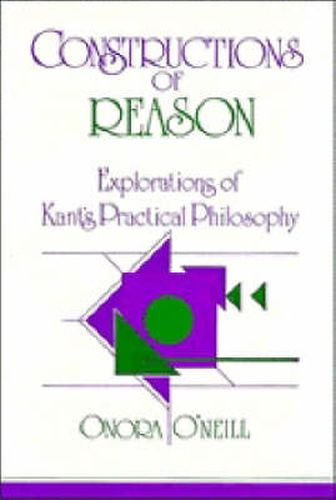Readings Newsletter
Become a Readings Member to make your shopping experience even easier.
Sign in or sign up for free!
You’re not far away from qualifying for FREE standard shipping within Australia
You’ve qualified for FREE standard shipping within Australia
The cart is loading…






Two centuries after they were published, Kant’s ethical writings are as much admired and imitated as they have ever been, yet serious and long-standing accusations of internal incoherence remain unresolved. Onora O'Neill traces the alleged incoherences to attempts to assimilate Kant’s ethical writings to modern conceptions of rationality, action and rights. When the temptation to assimilate is resisted, a strikingly different and more cohesive account of reason and morality emerges. Kant offers a constructivist vindication of reason and a moral vision in which obligations are prior to rights and in which justice and virtue are linked. O'Neill begins by reconsidering Kant’s conceptions of philosophical method, reason, freedom, autonomy and action. She then moves on to the more familiar terrain of interpretation of the Categorical Imperative, while in the last section she emphasizes differences between Kant’s ethics and recent Kantian ethics, including the work of John Rawls and other contemporary liberal political philosophers.
$9.00 standard shipping within Australia
FREE standard shipping within Australia for orders over $100.00
Express & International shipping calculated at checkout
Two centuries after they were published, Kant’s ethical writings are as much admired and imitated as they have ever been, yet serious and long-standing accusations of internal incoherence remain unresolved. Onora O'Neill traces the alleged incoherences to attempts to assimilate Kant’s ethical writings to modern conceptions of rationality, action and rights. When the temptation to assimilate is resisted, a strikingly different and more cohesive account of reason and morality emerges. Kant offers a constructivist vindication of reason and a moral vision in which obligations are prior to rights and in which justice and virtue are linked. O'Neill begins by reconsidering Kant’s conceptions of philosophical method, reason, freedom, autonomy and action. She then moves on to the more familiar terrain of interpretation of the Categorical Imperative, while in the last section she emphasizes differences between Kant’s ethics and recent Kantian ethics, including the work of John Rawls and other contemporary liberal political philosophers.